- Home
- Top 10 Creeper & Climber Plants
- Thunbergia Grandiflora- Creepers &...
Thunbergia Grandiflora- Creepers & Climbers




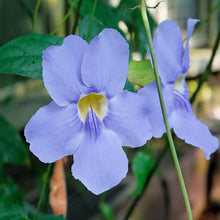
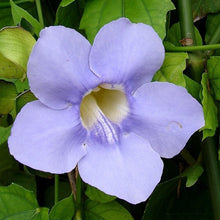
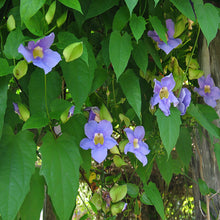
Thunbergia Grandiflora- Creepers & Climbers




Damaged or lifeless? We’ll replace it for free. Learn more
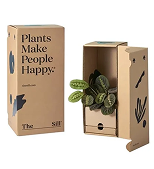
Double layered custom boxes to protect plants during shipping.
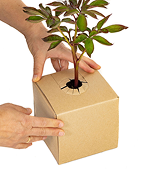
Air vents for proper air-flow
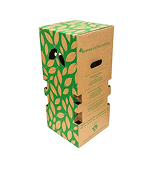
To preserve plant freshness during transit
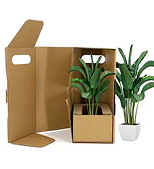
Details steps of how to grow and maintain your plant
Thunbergia is Botanically known as Thunbergia grandiflora from the Acanthaceae family. Common names are Bengal clock vine, Bengal trumpet, blue skyflower, blue thunbergia, blue trumpet vine clock vine, skyflower, and sky vine, etc. It is a perennial semi-evergreen flowering vine & it requires trelling or chain-like fencing or arbors for growing over it. It can be grown in big pots/containers and it has a light bluish color flower with a yellowish throat.
Plants may grow to about 20 meters in height and have a long root system if planted in the ground. The stalked, opposite leaves, which have a rough surface, are quite variable in shape. They may be triangular or ovate and the margins may be toothed, lobed or entire. The blue to mauve flowers are about 8 cm across with a 4 cm long tube that is pale yellow throat. These are followed by pods containing seeds that are ejected several meters upon ripening.
MAXIMUM HEIGHT - It can reach more than 20 meters of height.
BLOOMING YEAR - Almost Year-round flowering, sometimes goes to dormancy in winter, it depends on the particular climatic condition of that area.
GROWING TIPS - It can grow almost in all types of soil and it can easily grow in any Indian Climatic condition.
- Plants grow very quickly and should be given strong support to climb on.
- For fast growth, it needs support, the more support it will grow very quickly.
- It can grow either in full sunlight or partial sunlight is also okay to grow.
- For lush green & bushy appearance better to plant it directly in the soil.
- After 20-25 days you can transplant it into your permanent location in full bright light condition.
- It can also grow in bushy conditions, if planted in a pot and by regular pruning.
INSIDE THE BOX
| S.No. | PRODUCT NAME | DIMENSION |
| 1. | Thunbergia Plant | 1-2 Feet Height |
| 2. | Growing Pot (Black color) | 6 Inch |
*above specifications are for indicative purposes only, actual dimensions may slightly vary.
PLANT CARE
LIGHT CONDITION - It requires a minimum of more than 3 hours of Direct Sunlight. If planted in full shade the blooming frequency will be reduced.
WATERING SCHEDULE - Water when the topsoil(2-3 inches) feels dry to touch. Always maintain moisture near the root zone.
SOIL TYPE - The soil should be well-drained, fertile & rich in organic content.
FERTILIZER APPLICATION - Apply any Organic Fertilizer Once in a month.
PLANT PROTECTION - Remove dead, infected, or damaged plant parts and discard them away from the plants. Generally, it is not affected by any pest & disease in case of any insect attack or disease, you can use Neem oil, Eucalyptus oil, or Citrus oil spray for primary treatment.
INITIAL CARE FOR 10-15 DAYS JUST AFTER RECEIVING YOUR PLANT
- Remove the Packaging Materials carefully.
- Press the soil in the pot & add additional soil(garden mix) if necessary.
- Maintain moisture in the pot, Do not overwater it may kill your plant, so make sure that the soil should be dry between watering.
- Provide support with stick/moss stick(vine plant) in order to make straight growth, for needed plant only.
- Make sure that plants get enough morning direct bright light for 10-15 days & do not go for immediate transplanting(minimum 1 month)
- Just prune if any branch of the plant is get damaged in transit. New leaves will come very fast.
Selected plant of 8-10 inches
Planted into a 5-inch pot
With healthy, moisture-retaining soil
A care instruction sheet for maintenance guide

Get in touch for best pricing on bulk orders and landscaping projects.
 WhatsApp us
WhatsApp us

Call on 9177805454 (Mon-Sat, 9 AM-6 PM) or WhatsApp us – we’re here to help.
About Exotic Flora
At Exotic Flora, we’re passionate about bridging the gap in bringing plants to everyone. With over 500+ varieties across 7 plant categories, from exotic finds to everyday greens, we bring the entire range to you.
Our plants, sourced from all parts of India are nurtured at Kadiyam, in our 25 acres in-house nursery by a team of expert horticulturists. Once they are ready we ship all our plant varieties across India.
Our services go beyond safe delivery of plants. A dedicated support team is there to help you with any maintenance queries you may have.
At Exotic Flora we always believe in going that extra mile, because everyone should have the plants they love.
It grows horizontally. Creepers are plants with stems that grow along the ground, around another plant / on a wall by means of extending stems or branches.
It grows vertically. Climbers are plants with a tender stem that grow with the help of external support. They climb over the other by twine or hook from their leaves & stems.
It depends on the plant varieties and the available space for spreading. In General, a creeper can spread up to 15 meters.
Perennial creepers/climbers are plants that live or grow for a long time (more than a year)
List of plants that can also grow in Indirect bright light is All money plants, Pink wall creeper, All thunbergia, Ipomoea cairica & Ipomoea black, Hari Champa, Cissus nodosa, Mandevilla, and Trachelospermum jasminoides.
Minimum 3 years needed for a creeper plants to cover 5-10 meter of walls. But it also depends on the Plant care and plant variety.
It is always good to read both together, Creepers grow horizontally, it creeps on the ground whereas Climbers grow vertically by external support by their twine, tendrils, and other supportive structure.
Minimum 4-6hours of direct bright light are necessary for flower plants to produce flowers. The soil should be well-drained, fertile, and organic in nature, the sandy-loam soil is the best soil for flowering plants.
The best Fertilizers are Organic fertilizers & Organic compost, manure to apply to your flowers. Remember Phosphorus based fertilizers are best to produce more flowers. Look at the descriptions of each plant for plant care guidelines.
There are some creepers like Curtain creeper, Elephant creeper, Dolichandra unguis cati, Thunbergia, Passion flower, Wall creeper, Ipomoea etc, are very suitable for making privacy or providing like structure for shade purpose.